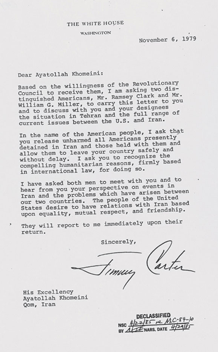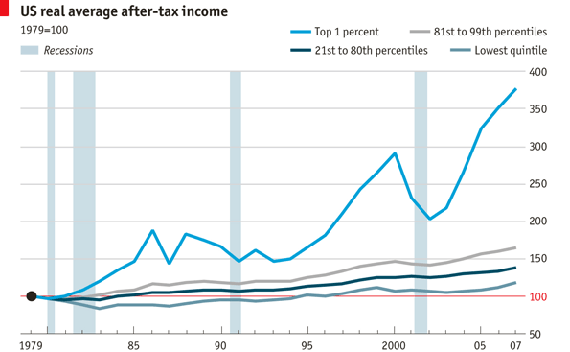
Above the Fold. Thirty-two years ago today Iranian “students” seized control of the U.S. embassy in Tehran, touching off the 444-day Iranian hostage crisis that doomed Jimmy Carter’s presidency and swept Ronald Reagan into the White House. The crisis came at the end of what had been a lousy decade for Americans: the United States had lost the Vietnam War, interest rates had soared, and a once roaring economy had slipped into stagflation. The country’s mood turned decidedly pessimistic, a sentiment that was hardly helped by ABC’s nightly television show: “The Iran Crisis—America Held Hostage: Day XXX.” (For those too young to recall, the show that was eventually renamed "Nightline" raised the number each day, so Day 5 gave way to Day 6, which gave way to Day 7, and so forth. A daily testament to national weakness hardly inspires.) Looking back at the intervening three decades two things stand out. One is that despite the passage of time and the offer of a birthday cake and a message celebrating Nowruz, not much has changed in U.S.-Iranian relations or in Americans attitudes toward Iran. Herman Cain’s comment this week that he would be “alright” with a “shooting war” with Iran would have resonated with the students I saw singing (to the tune of the Beach Boy’s “Barbara Ann”) “Bomb, Bomb, Bomb, Bomb, Bomb, Iran” in Ann Arbor back in 1979. The other is that even as things remain the same they also change. The pessimism of the late 1970s eventually gave way to the Morning in America. With any luck the same will happen with our current national self-doubt.
CFR Event of the Week: Pervez Musharraf, former president of the Islamic Republic of Pakistan, came to speak this week at CFR. He plans to return to Pakistan next year to contest the country’s 2013 elections, so don’t be surprised if you see his name back in the headlines soon. At his talk this week, Musharraf discussed President Obama’s endorsement of India’s bid for a permanent seat on the United Nations Security Council, the current situation in Afghanistan, and drone attacks on Pakistani soil among other topics. You can read the transcript, download the audio, or watch the video.
Read of the Week. The New Yorker’s John Anderson looks at the last days of Muammar al-Qaddafi. In a nutshell, “Qaddafi did not leave anything behind except material and cultural destruction.” That does not bode well for Libya’s future.
Blog Post of the Week. Congress’s super committee now has nineteen days to strike a long-term deficit reduction deal. Both parties appear to be digging in their heels, raising the prospect that the sequestration trigger will be pulled. This has caused many Pentagon officials to worry publicly that the defense budgets will be recklessly slashed. Spencer Ackerman’s message to the brass is to stop worrying. Even if the super committee comes up empty, Ackerman argues that history as well as inevitable political pressures virtually guarantee that Congress will rewrite the sequestration rules before they go into effect in January 2013.
Poll Question of the Week. President Obama announced late last month that all U.S. troops will leave Iraq by the end of the year. Most Republican presidential candidates have criticized the decision. So what do Americans think? According to Gallup, Americans are solidly in the president’s corner. Seventy-five percent of all Americans approve of the decision. But the partisan breakdown is dramatic. Ninety-six percent of Democrats approve, while 53 percent of Republicans disapprove. Those numbers tells you why politics frequently doesn’t stop at the water’s edge.
Chart of the Week. The Occupy Wall Street movement has made the phrase “the 99 percent” the hottest new political buzzword. So just how different has the experience of the top 1 percent been from everyone else’s over the past decade? As the chart below shows, when it comes to real-income growth—that is, after accounting for the effects of inflation—the difference is substantial. The three decades after 1979 were spectacularly good ones for the top 1 percent of wage earners, even with the 2000-2001 tech crash. In comparison, the bottom 80 percent of wage earners were only marginally better off in 2007 than they were in 1979—and much of that gain was probably lost in the wake of the 2008-2009 financial crash. Whether one is impressed by the gap between the top 1 percent and everyone else, or by the fact that the trend lines for everyone but the top 1 percent are relatively flat, the chart provides some indication of why so many Americans are pessimistic about the direction of the country, and have been for quite some time.
Chart source: The Economist.
Too Good Not to Note. Liz Economy tries to decipher China’s strategy at the G-20 meeting. Adam Segal mulls over the meaning of a recently released report on economic espionage by the Office of the National Counterintelligence Executive that points the finger at China and Russia. Steve Walt doesn’t think much of Mitt Romney’s statement that the United States shouldn’t play the role of leader in the Middle East peace process. Laura Rozen reports that Israeli leaders may be moving toward a decision to strike Iranian nuclear facilities. John Rogin reports that Sen. Lindsey Graham (R-SC) intends to introduce legislation to withdraw the United States from any international organization that makes Palestine a member. Geoffrey Wheatcroft thinks it might be time to call it a day on Britain’s so-called special relationship with the United States. Nate Silver handicaps the 2012 presidential election and concludes that the odds slightly favor Obama becoming a one-term president. Mohamed El-Erian, the CEO of the global investment firm PIMCO, worries that the United States could follow the path set by Japan, which experienced a lost decade of growth after its market crash. Pierre Buhler says that if “demography is destiny,” Europe is in trouble.
Perils of Prediction. “Mr. Lincoln is already beaten. He cannot be re-elected.” Horace Greeley, the editor of the New York Tribune who is often erroneously credited with saying “Go West Young Man,” writing on Abraham Lincoln’s re-election chances on August 14, 1864. Lincoln won 212 electoral votes; his opponent, General George B. McClellan won just twenty-one, which is all for the good, because if McClellan had won, we would’ve missed Lincoln’s magisterial second inaugural address.
Quote to Ponder. “Skate where the puck is going to be, not where it has been.” Wayne Gretzky, NHL great.
A Reason to Smile. The extra hour of sleep that comes with the end of daylight savings time.
